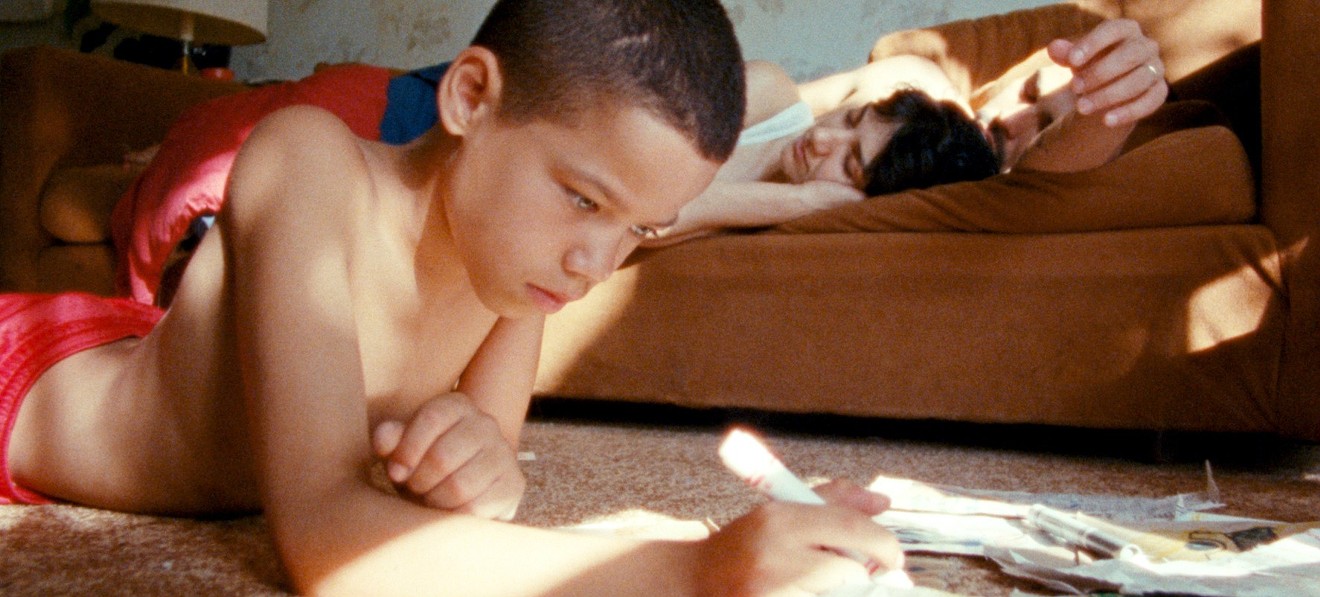Brawling yet tender, wild yet rigorously controlled, first-time fiction director Jeremiah Zagar’s We the Animals is an impressionistic swirl of a film about masculinity, about abuse, about growing up queer, about chaotic family life, about the jumble of incidents and stirrings through which a child discovers a self. It’s essentially plotless yet dense with incident, even with its share of shocks. Much of its beautiful, sometimes tragic power comes from a sense of stasis. For the family at its heart, everything seems to be in constant, even terrifying disorder, and yet nothing really changes — not after one son discovers he’s different, not even after dad knocks out mom’s teeth.
Adapted from Justin Torres’ autobiographical novel, Zagar’s film immerses us in the adolescence of Jonah (Evan Rosado), the youngest of three vigorously rambunctious, perennially shirtless brothers coming up rough in upstate New York. Zagar captures their childhoods in hurtling wide shots of kids running amuck: chest-beating forest play, feral screaming in an abandoned silo, raiding the fridge, they jab their hands into peanut butter and lick off their fingers. Zagar and cinematographer Zak Mulligan, who have collaborated on Zagar’s documentary films, shot We the Animals on Super 16 mm film, utilizing wide lenses, tracking the kids as they bound across glades or kitchens rather than fussily staging their movements. The result is a freewheeling, intimate, hazy look, marked by a graininess that suggests not just home movies but the memory of home movies. Sequences of the boys bounding about have that endless-summer warmth: the sun in your hair, that essence of endless, aimless childhood.
Their parents love each other, and them, but are volatile and overwhelmed. Their cars break down, their bosses are assholes, their near-feral kiddos limit their options. And, sometimes, the father (Raul Castillo) hits the mother (Sheila Vand). Those rowdy wide shots are complemented by raw and delicate close-ups; it’s terrifying when the energy of the former bursts into the latter, when a huggy family dogpile inspires the boys to slap their father’s bare back in imitation of his own occasional violence.
Zagar punctuates all this with inky animated reveries lifted from Jonah’s notebook and imagination. He hides under the bed at night, writing stories and drawing cartoons, making sense of the tumult. An older neighbor boy shows the brothers some cable TV pornography, including a flash of man on man; those undulations work their way into Jonah’s daydreams. It’s only at the film’s end that he has begun to understand how he’s different from his brothers — a contrast explored in two tense yet moving scenes. As always in We the Animals, what happens is momentous yet not enough to shatter this family’s tangled bonds.
[
{
"name": "Air - MediumRectangle - Inline Content - Mobile Display Size",
"component": "18855504",
"insertPoint": "2",
"requiredCountToDisplay": "2"
},{
"name": "Editor Picks",
"component": "17105533",
"insertPoint": "4",
"requiredCountToDisplay": "1"
},{
"name": "Inline Links",
"component": "18349797",
"insertPoint": "8th",
"startingPoint": 8,
"requiredCountToDisplay": "7",
"maxInsertions": 25
},{
"name": "Air - MediumRectangle - Combo - Inline Content",
"component": "17105532",
"insertPoint": "8th",
"startingPoint": 8,
"requiredCountToDisplay": "7",
"maxInsertions": 25
},{
"name": "Inline Links",
"component": "18349797",
"insertPoint": "8th",
"startingPoint": 12,
"requiredCountToDisplay": "11",
"maxInsertions": 25
},{
"name": "Air - Leaderboard Tower - Combo - Inline Content",
"component": "17105535",
"insertPoint": "8th",
"startingPoint": 12,
"requiredCountToDisplay": "11",
"maxInsertions": 25
}
]












